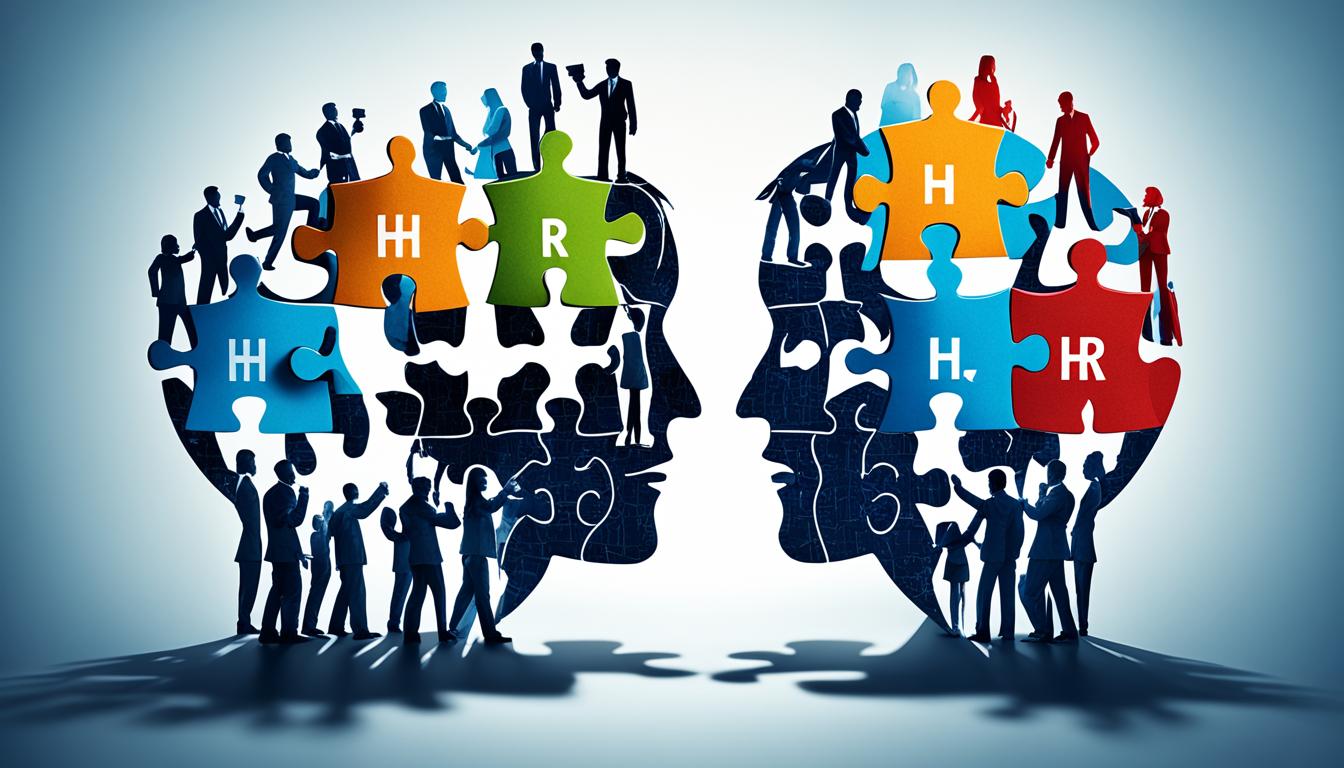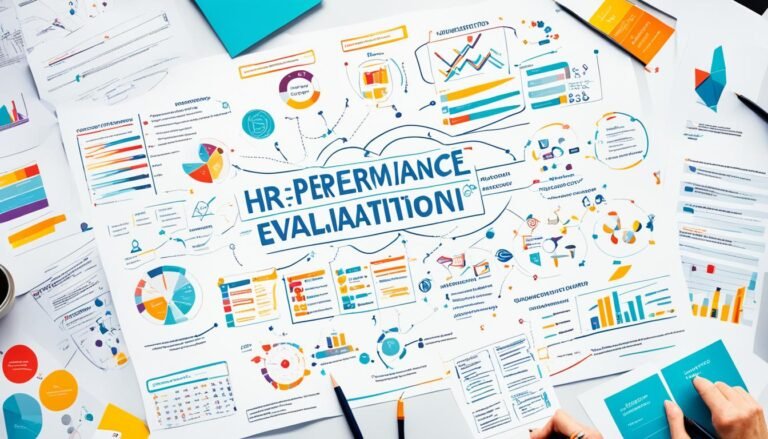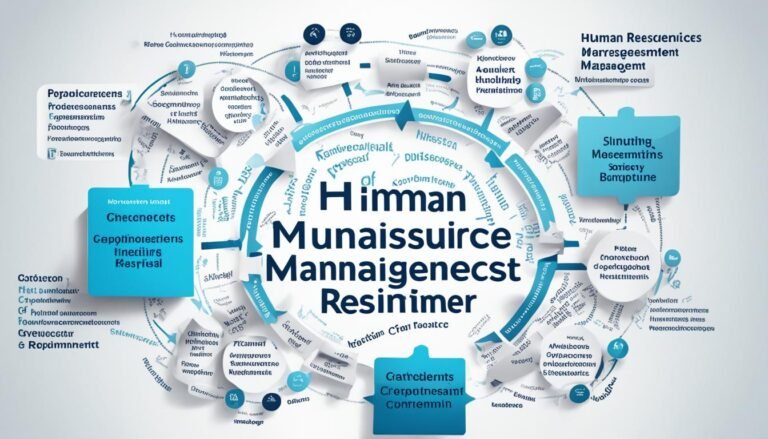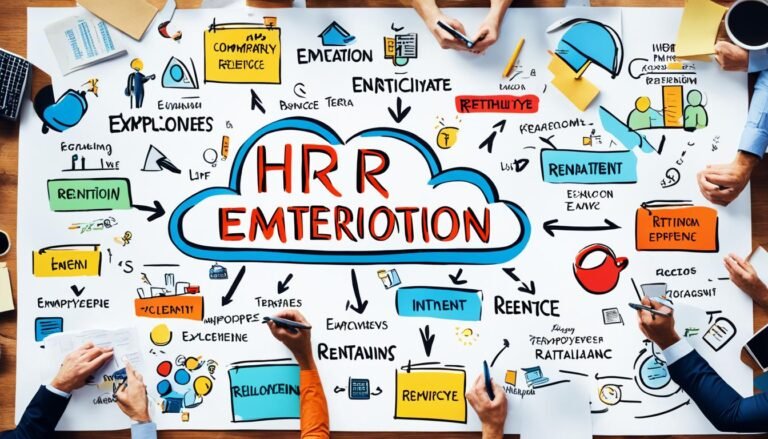A Guide to Human Resource Management Skills
Human resource management is a rapidly growing career with employment projected to increase by 9% from 2014 to 2024, according to the Bureau of Labor Statistics. As the field has expanded, so too have the responsibilities and skills required for success in HR roles. In this comprehensive guide, we will explore the key human resource management skills necessary for professionals in this field.
Key Takeaways:
- HR professionals need a diverse range of skills to excel in their roles.
- These skills include business management, leadership, and human capital development.
- Effective communication and strategic thinking are essential for HR success.
- Workplace culture development is crucial for creating a positive work environment.
- Continual professional development is important for staying competitive in the field of HR.
Business Management & Leadership Skills
Business management and leadership skills are fundamental for human resource managers to be successful. HR professionals must be equipped to handle organizational challenges in businesses of all sizes and navigate issues such as diversity and inclusion, hiring laws, employee rights, benefit packages, and organizational culture. Additionally, HR managers must possess effective leadership skills to coach and develop employees into leaders and cultivate a culture of agility and problem-solving throughout the organization.
“Effective leadership is not about being in control, but rather about guiding others towards a shared vision of success.” – Peter Drucker
Developing strong business management skills allows HR professionals to understand the big picture of an organization and align HR strategies with overall goals. This includes strategic planning, financial acumen, project management, and a comprehensive understanding of the market and industry trends. Organizational challenges require HR professionals to be adaptable and innovative, finding solutions to complex problems and anticipating future needs.
A critical aspect of HR leadership is building trust and credibility with employees, executives, and stakeholders. Effective leaders inspire and motivate individuals to perform at their best, creating a positive work culture that fosters collaboration, engagement, and productivity.
Image:
Human Capital Development Skills
Human resource professionals play a crucial role in developing and harnessing the potential of their organization’s workforce. Instead of solely focusing on hiring new employees, HR managers need to view employees as individuals with diverse skills and invest in their development. This entails providing training, education, and opportunities for advancement to nurture human capital within the organization.
One effective strategy for human capital development is the implementation of mentorship programs. These programs pair experienced employees with less experienced ones, fostering knowledge transfer and skill development. Through guidance and support, mentorship programs help employees grow and advance in their careers.
Another approach to human capital development is the provision of training programs. These programs equip employees with the necessary skills and knowledge to excel in their roles and contribute to the organization’s success. By investing in training initiatives, HR professionals create a culture of continuous learning and development, enhancing both individual and organizational performance.
Furthermore, internal advancement opportunities are key to human capital development. HR managers should identify high-potential employees and provide them with pathways for growth within the organization. This not only motivates employees but also ensures that talent is nurtured and retained, leading to a more skilled and engaged workforce.
Mentorship Program Framework
| Mentorship Program Framework | Description |
|---|---|
| Goal | To facilitate knowledge transfer, skill development, and career growth through a structured mentorship program. |
| Structure | Pairing experienced employees with less experienced ones to establish a mentor-mentee relationship. |
| Benefits | Opportunity for mentees to learn from experienced professionals, gain insight into the organization’s culture, and develop essential skills. Mentors enhance their leadership and coaching abilities while building a sense of fulfillment from helping others progress in their careers. |
| Implementation | Identify potential mentors and mentees based on their experience, skills, and goals. Establish clear goals and expectations for the program. Provide necessary resources and support for mentor-mentee pairs to thrive. |
By recognizing the importance of human capital development and implementing strategies such as mentorship programs, training initiatives, and internal advancement opportunities, HR professionals can effectively manage and develop their organization’s most valuable asset – its people. This not only enhances employee satisfaction and engagement but also drives overall organizational success.
Communication & Interpersonal Skills
Communication and interpersonal skills are fundamental for HR professionals to effectively fulfill their roles. As HR professionals interact with employees at all levels of the organization, it is essential to communicate in a warm, clear, and professional manner. These skills are pivotal in fostering effective relationships, resolving conflicts, and creating a respectful and inclusive work environment.
Active listening plays a vital role in effective communication. By attentively listening to employees’ concerns and feedback, HR professionals can gain valuable insights and demonstrate empathy. This, in turn, builds trust and strengthens relationships within the organization.
Conflict resolution is another critical skill for HR professionals. By utilizing conflict resolution techniques such as negotiation, mediation, and problem-solving, HR professionals can address and resolve conflicts in a fair and impartial manner. This skill contributes to maintaining a harmonious work environment and enhances employee satisfaction.
“Effective communication is the foundation of strong workplace relationships and successful HR management.”
Counseling is also an important aspect of HR professionals’ work. They may provide guidance and support to employees facing personal or professional challenges, such as workplace stress, career development, or work-life balance. By utilizing counseling skills, HR professionals can empower employees to overcome obstacles and achieve their full potential.
Lastly, inclusive language plays a crucial role in creating a diverse and respectful work environment. HR professionals should use language that reflects respect for all individuals, avoids stereotypes, and promotes inclusivity. By using inclusive language, HR professionals contribute to a positive and inclusive workplace culture where all employees feel valued and appreciated.
Key Points:
- Effective communication and interpersonal skills are essential for HR professionals.
- Active listening builds trust and strengthens relationships.
- Conflict resolution techniques enable HR professionals to address and resolve conflicts.
- Counseling skills empower employees to overcome challenges and achieve their full potential.
- Inclusive language fosters a respectful and diverse work environment.
| Communication Skills | Interpersonal Skills | |
|---|---|---|
| Definition | The ability to convey information and ideas effectively through various channels of communication. | The ability to build and maintain relationships, understand others’ emotions, and work collaboratively. |
| Importance | Enables clear and concise information exchange, facilitates understanding, and minimizes misunderstandings. | Fosters positive working relationships, promotes teamwork, and enhances collaboration. |
| Key Skills |
|
|
| Example | Effectively communicating new policies and procedures to all employees. | Collaborating with team members on a project, considering their perspectives and ideas. |
Strategic Thinking & Planning Skills
Strategic thinking and planning skills play a critical role in the success of HR professionals. By aligning their practices with the organization’s strategic goals, HR managers contribute to the overall growth and development of the company. These skills enable HR professionals to make data-driven decisions that optimize recruitment, training, development, and retention processes.
HR managers possess a deep understanding of the organization’s needs and are detail-oriented in their approach. They analyze and interpret data to identify opportunities for improvement and implement strategic initiatives that drive efficiency in recruitment, training, and retention. Through strategic planning, HR professionals ensure that the organization has the right talent in place to achieve its objectives.
By incorporating the human resource lens into the overall strategy and direction of the organization, HR professionals strengthen the alignment between HR practices and the company’s long-term vision. This strategic perspective empowers HR managers to proactively address challenges and anticipate future workforce needs.
Effective strategic thinking and planning skills empower HR professionals to create a robust talent pipeline and ensure the right people are in the right roles. Through careful workforce planning and efficient resource allocation, HR managers contribute to the organization’s overall success and sustainability.
Recruitment, training, and retention are optimized through strategic thinking and planning skills, allowing HR professionals to navigate the complex landscape of talent management and align HR practices with the organization’s strategic goals.
Data-Driven Decision Making
Data-driven decision making is an integral component of strategic thinking and planning in HR. By leveraging relevant data and analytics, HR professionals gain insights into workforce trends, employee engagement levels, and performance metrics. This data-driven approach enables HR managers to make informed decisions regarding recruitment strategies, training programs, and retention strategies. Moreover, it ensures that HR practices are aligned with the organization’s strategic goals and contribute to long-term success.
Strategic Recruitment
Effective strategic thinking and planning skills enable HR professionals to optimize the recruitment process. HR managers utilize data and analytics to identify the most effective recruitment channels, target desired candidate profiles, and streamline the selection process. By strategically attracting and hiring top talent, HR professionals contribute to the overall strength and competitiveness of the organization.
Training and Development Initiatives
Strategic thinking and planning skills are crucial in developing comprehensive training and development programs that address the organization’s current and future needs. HR professionals analyze skills gaps, identify training requirements, and design tailored programs to enhance employee competencies. Through strategic planning, HR managers ensure that training initiatives align with the organization’s strategic goals and foster the growth and development of employees.
Retention Strategies
Retention efficiency is improved through strategic thinking and planning skills. HR professionals use data analysis to identify key factors influencing employee retention and develop targeted strategies to boost employee satisfaction and engagement. By crafting retention initiatives that align with the organization’s culture and values, HR managers create a positive work environment that promotes employee loyalty and reduces turnover.
Workplace Culture Development Skills
Creating a positive and engaging workplace culture is a crucial aspect of effective human resource management. HR professionals play a pivotal role in developing, shaping, and leading workplace culture to foster a productive and harmonious work environment.
A positive work environment is essential for promoting employee satisfaction, productivity, and overall organizational success. It is characterized by a set of values and behaviors that guide employee interactions and shape the organization’s identity.
HR professionals must prioritize workplace culture development by focusing on key aspects such as:
- Values: Defining and promoting the core values that align with the organization’s mission and vision.
- Behaviors: Encouraging and fostering desirable behaviors that reflect the organization’s values.
- Leadership: Cultivating strong and ethical leadership at all levels of the organization.
- Employee Engagement: Creating opportunities for employee participation, involvement, and feedback.
- Recognition: Implementing recognition programs to acknowledge and appreciate employee contributions.
By prioritizing workplace culture development, HR professionals create an environment where employees feel valued, empowered, and motivated to perform at their best. This fosters a sense of belonging and commitment, resulting in higher employee satisfaction and retention.
“A strong and positive workplace culture is the foundation for attracting and retaining top talent, ensuring organizational success.” – Jane Thompson, HR Director
Workplace culture development also extends to promoting diversity, inclusion, and wellbeing. HR professionals must advocate for diversity and inclusion initiatives, ensuring that employees from all backgrounds feel supported and respected. Additionally, promoting employee wellbeing through wellness programs and initiatives contributes to a healthier and happier workforce.
Building a Positive Work Environment
A positive work environment is characterized by open communication, collaboration, and trust. HR professionals can foster a positive work environment through:
- Encouraging open and transparent communication channels.
- Facilitating teamwork and collaboration across departments.
- Providing opportunities for employee development and growth.
- Implementing work-life balance initiatives.
- Ensuring fairness in policies and procedures.
Developing Skills for Effective Human Resource Management
HR professionals play a crucial role in the success of an organization. To excel in their field, they need to continuously develop their skills and stay updated with the latest industry trends. This section explores various ways through which HR professionals can enhance their expertise and credentials to become more effective in managing human resources.
On-The-Job Experience
One of the best ways for HR professionals to develop their skills is through on-the-job experience. Working in real-world scenarios helps them gain practical insights into the challenges and complexities of HR management. By actively participating in HR initiatives, projects, and problem-solving activities, professionals can sharpen their skills and acquire new ones.
Education in HR Management
Pursuing a degree or certificate in HR management or related fields provides HR professionals with a solid foundation of knowledge and skills. It equips them with a comprehensive understanding of HR principles, practices, and strategies. Whether it’s earning an HR degree or obtaining a specialized HR management certificate, formal education contributes to enhancing HR professionals’ credibility and expertise.
Continuous Learning
HR professionals should embrace a mindset of continuous learning and ongoing professional development. Keeping pace with industry trends, updates, and best practices is essential to remain competitive in the field. This can be achieved through attending seminars, workshops, conferences, and webinars, as well as pursuing relevant certifications and memberships in HR associations.
Skills Enhancement Programs
There are various skills enhancement programs designed specifically for HR professionals. These programs offer specialized training in areas such as strategic HR planning, talent acquisition and retention, performance management, and employee relations. HR professionals should actively seek out such programs to expand their skill set and stay up-to-date with emerging HR trends.
Networking and Mentorship
Networking with other HR professionals and seeking mentorship from experienced practitioners can significantly contribute to HR skills development. By connecting with industry experts, attending HR events, and participating in professional HR communities, professionals can gain valuable insights, guidance, and support. Mentors can provide practical advice, share their experiences, and help HR professionals navigate their career paths.
Incorporating Technology
The HR field is evolving rapidly with the integration of technology. HR professionals should embrace modern HR technologies, such as HR management systems, data analytics tools, and employee engagement platforms. By understanding and leveraging these technologies, HR professionals can enhance their efficiency, decision-making capabilities, and overall effectiveness in managing human resources.
Remember, developing HR skills is an ongoing process that requires dedication, commitment, and a passion for continuous improvement. By investing in their professional development and staying updated with industry trends, HR professionals can excel in their roles and make a significant impact on the success of their organizations.
The Impact of HR Skills
HR skills play a crucial role in driving organizational success. By effectively applying leadership, communication, talent management, and workplace culture development, HR professionals contribute to employee satisfaction, engagement, and overall performance of the organization.
Effective leadership is essential for HR professionals to guide and inspire their teams. Strong leaders create a positive work environment, motivate employees, and foster a culture of continuous growth and improvement.
Communication is another vital skill for HR professionals. Clear and effective communication ensures that employees understand organizational goals, policies, and procedures. It also facilitates collaboration, resolves conflicts, and strengthens relationships within the workplace.
Talent management is a strategic HR skill that involves attracting, developing, and retaining top talent. HR professionals play a critical role in identifying and nurturing valuable employees, providing them with growth opportunities, and aligning their skills and expertise with the organization’s needs.
Workplace culture development is a key aspect of HR skills. HR professionals create an inclusive and supportive work environment that encourages employee engagement, diversity, and mutual respect. This leads to higher levels of employee satisfaction and improved organizational performance.
Ultimately, the development and application of HR skills are integral to driving positive outcomes within organizations. HR professionals who possess these skills contribute to improved employee satisfaction, increased productivity, and overall organizational success.
| HR Skills | Impact on Organizational Success |
|---|---|
| Leadership | Creates a positive work environment and motivates employees |
| Communication | Ensures clear understanding, resolves conflicts, and strengthens relationships |
| Talent Management | Attracts, develops, and retains top talent aligned with organizational needs |
| Workplace Culture Development | Fosters inclusivity, engagement, and employee satisfaction |
Conclusion
Developing a comprehensive set of Human Resource Management Skills is essential for HR professionals looking to advance their careers and make a positive impact in their organizations. By cultivating skills in leadership, communication, strategic thinking, and workplace culture development, HR professionals can effectively navigate the complex challenges of the modern workplace.
Continual career development through education and staying informed about industry trends is crucial for HR professionals to stay competitive in the ever-evolving field of HR. Pursuing additional credentials, such as a degree or certificate in HR management, can provide a solid foundation for success.
As HR professionals strive to drive organizational success, the development and application of these skills play a crucial role in various aspects, including leadership, talent management, and employee satisfaction. By prioritizing career development, HR professionals can contribute to their organization’s growth and foster a positive work environment conducive to individual and collective success.







